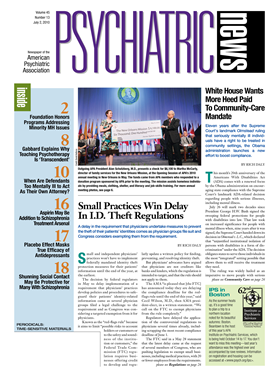To kill or not to kill.
That's the question that has engaged the United States Supreme Court in at least two recent cases in which psychiatric testimony and expertise have been central.
The decisions handed down by the Court reflect its profound ambivalence about capital punishment—an ambivalence that is mirrored in the public at large, where 34 states allow capital punishment but where lower courts have continuously striven to refine the circumstances under which convicts can be executed.
“Mostly right, but on the wrong track” is how Richard Bonnie, LL.B., director of the Institute of Law, Psychiatry, and Public Policy at the University of Virginia, described the Court's recent decisions—right when the justices have upheld the validity of psychiatric expertise, but wrong because the Court has continued to support the use of an ultimate punishment for which there has developed no rational means of determining who does and doesn't deserve it.
“In my judgment, the death penalty project has been a complete failure” in terms of its use to exact retribution and serve as a deterrent, Bonnie said at APA's annual meeting in May in New Orleans at the symposium “The Supreme Court and Psychiatry in the 21st Century.”
Bonnie was the discussant for a panel presentation by experts in psychiatry and the law about four recent Court decisions in which psychiatric testimony was prominent in or central to the case. Two of those were capital cases—Atkins v. Virginia (2002), discussed by past APA President Paul Appelbaum, M.D., and Panetti v. Quarterman (2007), discussed by Howard Zonana, M.D., a professor of psychiatry and director of the psychiatry and law program at Yale University.
Death Penalty Operates Arbitrarily
Of the capital cases, Bonnie said the judicial system has tried without success to rationally and fairly distinguish those who merit death from those who do not. But in practice, the death penalty operates arbitrarily—like a “roulette wheel,” he said—with odds tilted against those of color and lower socioeconomic class.
“The most prominent determinant for who receives the death penalty is the person's race,” he said.
In Panetti v. Quaterman, the Supreme Court ruled that criminal defendants sentenced to death may not be executed if they do not understand the reason for their imminent execution. In 1992, Scott Panetti killed his mother-in-law and father-in-law; three years later, he was tried in a Texas state court for capital murder.
Though floridly psychotic, with a long psychiatric history, he was found by a lower court to be competent for execution on the basis of a 1986 Supreme Court decision, Ford v. Wainwright, which stated that a defendant could be executed providing that he or she was aware of the state's rationale for the execution. The Supreme Court agreed to hear Panetti's appeal.
The ruling was overturned. “The Supreme Court said that the Ford standard was too restrictive,” Zonana said. “According to the Court's ruling [in Panetti], a defendant's awareness of the State's rationale for execution is not the same as a rational understanding of it.”
Noting that the concept of “rational” has been debated for centuries, Zonana added that the Court was careful to distinguish “irrationality” in its reasoning from psychopathy or lack of conscience or remorse about a deed. Rather, incompetence for execution depends on gross delusions stemming from serious mental illness, which, quoting Justice Anthony Kennedy, “may put an awareness of the link between crime and punishment in a context so far removed from reality that punishment can serve no proper purpose.”
But Zonana said the ruling and other similar cases before the Supreme Court have served to raise further difficult questions: Does someone need to understand death to be executed? And what is the difference between a factual and a rational understanding of the reason for execution?
Moreover, the issue of treating someone to restore competence for execution raises its own ethical problems for psychiatrists and other physicians. Zonana noted that the AMA, with help from APA, approved a policy in 1995 stating that physicians should not treat someone solely for the purpose of restoring the person to competence for execution and that to participate in an execution is unethical.
It's an issue that has surfaced in North Carolina, where the medical board had decreed—on the basis of the AMA policy—that physicians who participate in executions could lose their licenses, a decree that resulted in a virtual moratorium on executions in the state. The state Supreme Court then ruled that the medical board had exceeded its prerogative in impeding state law.
“So this subject is an ongoing struggle with enormous issues for people on both sides of the question,” Zonana said.
In Atkins v. Virginia, the Court ruled 6-3 that the use of capital punishment for defendants with mental retardation (MR) violates the Eighth Amendment's ban on cruel and unusual punishment, overturning the Court's earlier support of the same in the 1989 Penry v. Lynaugh decision.
Daryl Atkins and a codefendant in 1996 kidnapped a serviceman, forced him at gunpoint to withdraw money from an ATM, then drove to a secluded spot and shot him to death. A psychologist testifying for the defense said that Atkins was mentally retarded, but the jury sentenced him to death.
“The Supreme Court agreed to hear the appeal of Atkins and agreed to consider again whether mental retardation was an absolute bar to execution, 13 years after Penry,” Appelbaum said. “And indeed the Court this time held that executions of persons with mental retardation did violate the Eighth Amendment's proscriptions against cruel and unusual punishment.”
So what had changed?
Principally what had changed, according to the Court's ruling, was the “evolving standard of decency”: since Penry, 18 states ruled against use of execution for people with mental retardation. And the Court argued that in the case of mental retardation, execution does not contribute to the goals of either retribution or deterrence.
But Appelbaum added that the Court's decision, seemly straightforward, left many practical matters unresolved. These include how to define MR, how to assess MR, and what procedures should be allowed when attempting to make a determination of MR, including who should make it.
Appelbaum noted that some authorities speak of a numerical “bright line—the DSM-IV, for instance, defines MR as an IQ of 70 or below. But the American Association of Intellectual and Developmental Disabilities does not cite such a numerical cutoff.
“States differ in how they define MR,” he continued. “A bottom line on these differences is that a defendant may be eligible for the death penalty in one state, but not in another. We have a patchwork quilt of rules that have flowed out of Atkins, a case that was intended to create uniform proscription.”
Echoing Bonnie, Appelbaum said the Court's decision reflects society's ambivalence about the death penalty. “We are reluctant and unwilling to surrender the death penalty, but we nonetheless surround it with so many obstacles to its use that it can only rarely be applied.”


